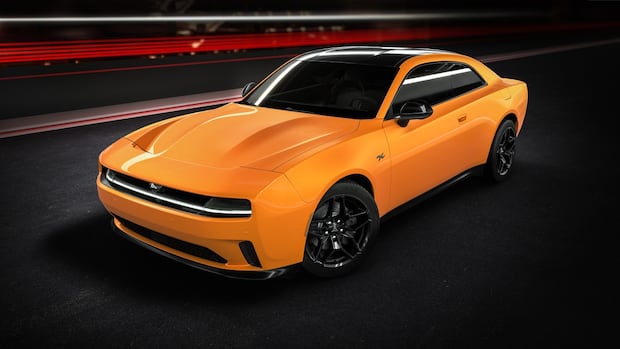A Canadian automobile journalist says Stellantis’s decision to postpone production of a Windsor, Ont.-made Dodge Charger model should be concerning for workers at its Windsor Assembly Plant — but it should not be a cause for panic.
Greg Layson says Stellantis didn’t sell a large number of electrified Chargers in the United States, so the company’s announcement Wednesday that it plans to postpone the 2026 Dodge Charger Daytona R/T, the base model of its EV muscle car, might be an effort to appease U.S. President Donald Trump without costing the company a lot of money.
“What I can tell you about Windsor is I’ve been told from people on the inside that, yes, they are focusing on internal combustion engine versions of the Dodge Charger,” said Layson, the digital and mobile editor for Automotive News Canada.
“That includes retooling the engine line, I’m told to put in a bigger engine.”
Stellantis says it plans to add a four-door Charger model in 2026, and add another new model in the second half of 2026.
Dodge CEO Matt McAlear issued a statement on Wednesday blaming the decision to postpone the Daytona R/T model on a need to “continue to assess the effects of U.S. tariff policies.”
No impact on jobs, company says
The Trump administration has levied 25 per cent tariffs on non-Canada-U.S.-Mexico Agreement (CUSMA)-compliant vehicles assembled in Canada, though there are carve-outs for American-made parts.
Stellantis says the decision has no impact on jobs.
The Windsor Assembly Plan employs roughly 4,500 people in the Windsor area.
There have been several shutdowns at the facility since the trade war between Canada and the U.S. began earlier this year.
Most recently, the company announced in early May there would be a mix of shutdowns, reduced hours and full production over 12 weeks — a change the company did not attribute to tariffs.
The facility is best known for producing Chrysler Pacifica minivans. Last December, production began on electric Dodge Charger models.
In the short-term, according to Layson, Stellantis’s latest move will mean fewer vehicles rolling off the line and the postponement of a planned third shift at the plant — something Stellantis confirmed in early May.
“You’re going to see more shifts smoothing; I don’t think you’ll see permanent layoffs,” Layson said.
“I don’t think anyone should be panicking — not in Windsor. The concerns should be greater up the 401 in places like Brampton where that factory is idle, in places like Oakville where that Ford factory is currently being retooled at a much slower pace than everyone thought.”
Minister ‘convinced that we can get to a good place’
Production on the 2026 Charger Daytona R/T was supposed to begin later this year. The company has not specified when it might resume.
Industry Minister Mélanie Joly told reporters Thursday morning that she talked with the CEO of Stellantis, who assured her that Canadian jobs were protected.
Innovation, Science and Industry Minister Mélanie Joly says she spoke with Jeff Hines, the CEO of Stellantis’s North American operations, Thursday morning and was assured that Canadian vehicle manufacturing jobs would be protected and the ‘conditions of workers would remain the same.’ Her comments follow news that the automaker is delaying production of the Ontario-made Dodge Charger because of U.S. tariffs.
“We agreed that we would continue conversations in a positive way regarding EV investments in Canada, and I’m convinced that we can get to a good place,” she said.
“Obviously, this decision is linked to U.S. tariffs, and so, as we said, we would continue to fight for Canadian jobs, create new ones and grow the Canadian economy.”

